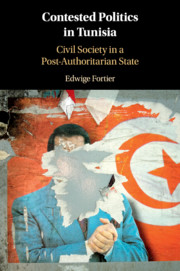Book contents
- Contested Politics in Tunisia
- Contested Politics in Tunisia
- Copyright page
- Dedication
- Contents
- Preface
- 1 Introduction
- 2 Situating Civil Society
- 3 The Consolidation of the Tunisian State
- 4 Civil Society and the Opening Up of the Public Space
- 5 Social Divisions and the Re-Manifestation of Social Islam
- 6 Consensus and Marginalisation
- 7 Conclusion
- Appendix: List of Interviewees
- Bibliography
- Index
- References
Bibliography
Published online by Cambridge University Press: 17 May 2019
- Contested Politics in Tunisia
- Contested Politics in Tunisia
- Copyright page
- Dedication
- Contents
- Preface
- 1 Introduction
- 2 Situating Civil Society
- 3 The Consolidation of the Tunisian State
- 4 Civil Society and the Opening Up of the Public Space
- 5 Social Divisions and the Re-Manifestation of Social Islam
- 6 Consensus and Marginalisation
- 7 Conclusion
- Appendix: List of Interviewees
- Bibliography
- Index
- References
- Type
- Chapter
- Information
- Contested Politics in TunisiaCivil Society in a Post-Authoritarian State, pp. 210 - 226Publisher: Cambridge University PressPrint publication year: 2019



